As state lawmakers and citizen activists continue to search for the best ways to regulate the payday loan industry, one local Catholic organization is not waiting.
Faced with watching some parishioners struggle to pay back high-interest loans, the Society of St. Vincent de Paul Diocese of Columbus launched its own microloan program in Licking County in late 2016. Since then, it’s expanded to four other counties.
Deb Zabloudil, a program volunteer, says the first loan helped a woman put tires on her car. She was able to pay it back and has since been able to get another loan for car repairs.
“We are motivated by our spiritual belief that we see the face of God in everyone we serve, so we want to treat everyone with dignity," Zabloudil says. "And part of being able to do that is to give someone the opportunity to take on a loan, be able to pay it back, and in the process we give them financial mentoring and hopefully give them more empowerment on making the kind of financial decisions that will help them get ahead.”
The non-profit organization has partnered with a local credit union to offer loans of up to $500. Borrowers then make monthly payments for 12 to 15 months to pay off loans that carry an interest rate of 3 percent.
That’s a fraction of the rate for loans from payday lending businesses, where interest can exceed 600 percent.
In 2008, Ohioans approved regulations to the payday lending industry that attempted to cap interest rates. But companies have been able to work around those rules by calling themselves by other names, such as auto title loan businesses and credit services providers.
The Catholic microloan program is open to people of all faiths, and Zabloudil says about 75 percent of loan recipients have made good on their payments. Part of the reason for that, Zabloudil says, is they work to ensure borrowers don’t get in over their head.
She doesn’t think payday lenders do the same.
“What we’re seeing is the problem (with payday loans) is the person doesn’t have enough disposable income to pay that loan off in two weeks. When the two weeks for that loan is up, they still have to rent, they still have to pay utilities, they still have to buy food,” Zabloudil says. “And if you now throw in having to pay back a $350 loan plus all the fees and interest for those two weeks, where’s the rent money going to come from?”
Zabloudil says many of the program's borrowers come to them with financial trouble stemming from payday loans. On top of making sure borrowers don’t get buried in debt, the St. Vincent de Paul program also partners them with a financial mentor who stays in contact with the borrower.
The program currently offers loan to people from Franklin, Delaware, Fairfield, Knox, Licking and Ross Counties. Zabloudil hopes to eventually take the program to the 17 other counties served by the Roman Catholic Diocese of Columbus.





